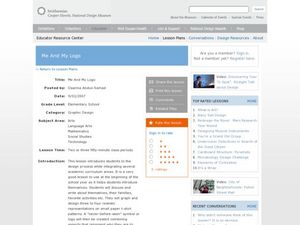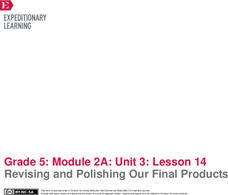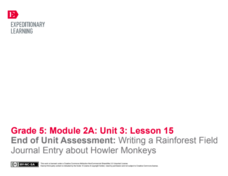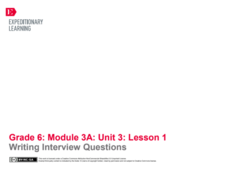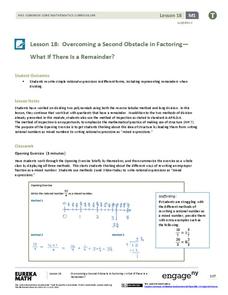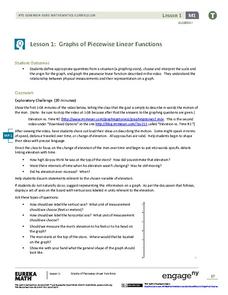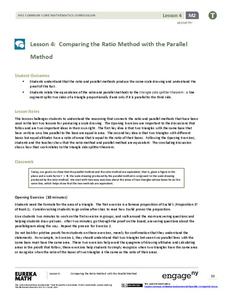Curated OER
Understanding Flashback
Student practice using the element of flashback. In this flashback lesson plan, students first discuss how this element is used and how it adds to a story. They complete their own creative writing piece and include a flashback scene.
Curated OER
Hire Me, I’m Nice: Writing a Resume
Students explore the classified ads for employment opportunities and create a resume. In this resume writing lesson students choose a specific job, they must determine what kind of experience, education, etc. they must have to acquire...
Curated OER
Create a Holiday for Your Favorite Hero
Pupils create a holiday for a hero. The person may be someone in history who is not currently honored with a holiday, another famous person, a family member, a friend, or someone else they admire.
Curated OER
Me and My Logo
Young scholars design their own emblem. In this introduction lesson, students get to know one another by designing an emblem that combines symbols that represent themselves. They express themselves to their classmates.
Curated OER
The Lion, the Witch and The Wardrobe: Literature and Theater
Students read and discuss the literary elements of "The Lion, the Witch and the Wardrobe" by C.S. Lewis. They explore the elements of dramatic performance and create a TV news program based on life in Narnia. They videotape their...
EngageNY
Revising and Polishing Our Final Products
One, two, three go! Scholars work independently to finalize the three components of their final task. They complete a science journal entry, scientific text box, and scientific drawing. While working, learners sign up for an...
EngageNY
End of Unit Assessment: Writing a Rainforest Field Journal Entry about Howler Monkeys
Give me more details. Scholars complete an end of unit assessment by creating an information text box to go with their field journal entries about howler monkeys. Learners use the class time to work independently.
EngageNY
Writing Interview Questions
And now for the star witness! Scholars take a look at a model newspaper article and discuss the importance of eyewitness accounts. In groups of three, they take turns underlining text from eyewitnesses. They then regroup to talk about...
EngageNY
How to Write Like a Scientist in the Field: Introduction to the Elements of Field Journals
It's time to start journaling. Scholars look at examples of science field journals. They work in pairs to examine and complete a note catcher about a field journal. They then add to an anchor chart by discussing the different features...
EngageNY
Reading about the Author’s Perspective: Why Do Authors Write about Natural Disasters?
It's all about perspective. Scholars view a note from the author in Eight Days. They determine the gist and discuss what they can learn about the author's background based on the note. They then complete a fishbowl activity in...
Food a Fact of Life
Creative Crumbles
Class cooks practice the rubbing technique and the preparation of a range of bases to produce an apple and sultana or herby veggie crumble.
EngageNY
Special Relationships Within Right Triangles—Dividing into Two Similar Sub-Triangles
Why are right triangles so special? Pupils begin their study of right triangles by examining similar right triangles. Verifying through proofs, scholars recognize the three similar right triangles formed by drawing the altitude. Once...
Curated OER
Persuasion and Parallel Structure
Discuss the definition of parallel structure with your high school class. In small groups, they read a section of "The Declaration of Independence" to identify examples of parallel structure. Each learner writes an essay explaining the...
Curated OER
I'm a Changed Pig - Personal Narrative
Young writers explore character arcs, conflict, and narrative in this complete and ready-to-use lesson plan from Scholastic. As a class read The Three Little Wolves and the Big Bad Pig and discuss the dramatic change the pig...
Curated OER
Children's Media and Censorship
High schoolers form opinions about children and television censorship after analyzing literature. They complete a journal writing activity to identify the topic and make a list of inappropriate television shows for children. Next, they...
EngageNY
Overcoming a Second Obstacle in Factoring—What If There Is a Remainder?
Looking for an alternative approach to long division? Show your classes how to use factoring in place of long division. Increase their fluency with factoring at the same time!
Curated OER
Nellie Bly's Newspaper Club: Introducing the Art of Writing
Students use video and the Internet to research the life of Nellie Bly, a famous female reporter from the 19th century. They research a writer and present their information to the class in the style of a news reporter.
Curated OER
Slimy Advertising and a Wicked Resume
Students compare and contrast a classic fairy tale with a fractured one. They write an advertisement that would entice a witch and a resume for a frog prince who is hiring. They publish their completed work.
Novelinks
Walk Two Moons: Story Impressions
Story chains connect literary concepts, reinforce context clues, and even help learners predict what's coming next! Using words from the next chapter of Sharon Creech's Walk Two Moons, middle schoolers craft story chains to...
EngageNY
Prove the Pythagorean Theorem Using Similarity
Amaze your classes with the ability to find side lengths of triangles immediately — they'll all want to know your trick! Learners use the Pythagorean Theorem and special right triangle relationships to find missing side lengths.
EngageNY
Graphs of Piecewise Linear Functions
Everybody loves video day! Grab your class's attention with this well-designed and engaging resource about graphing. The video introduces a scenario that will be graphed with a piecewise function, then makes a connection to domain...
EngageNY
Comparing the Ratio Method with the Parallel Method
Can you prove it? Lead your class through the development of the Side Splitter Theorem through proofs. Individuals connect the ratio and parallel method of dilation through an exploration of two proofs. After completing the proofs,...
EngageNY
Systems of Equations
What do you get when you cross a circle and a line? One, two, or maybe no solutions! Teach learners to find solutions of quadratic and linear systems. Connect the visual representation of the graph to the abstract algebraic methods.
EngageNY
Construct a Perpendicular Bisector
How hard can it be to split something in half? Learners investigate how previously learned concepts from angle bisectors can be used to develop ways to construct perpendicular bisectors. The resource also covers constructing a...



